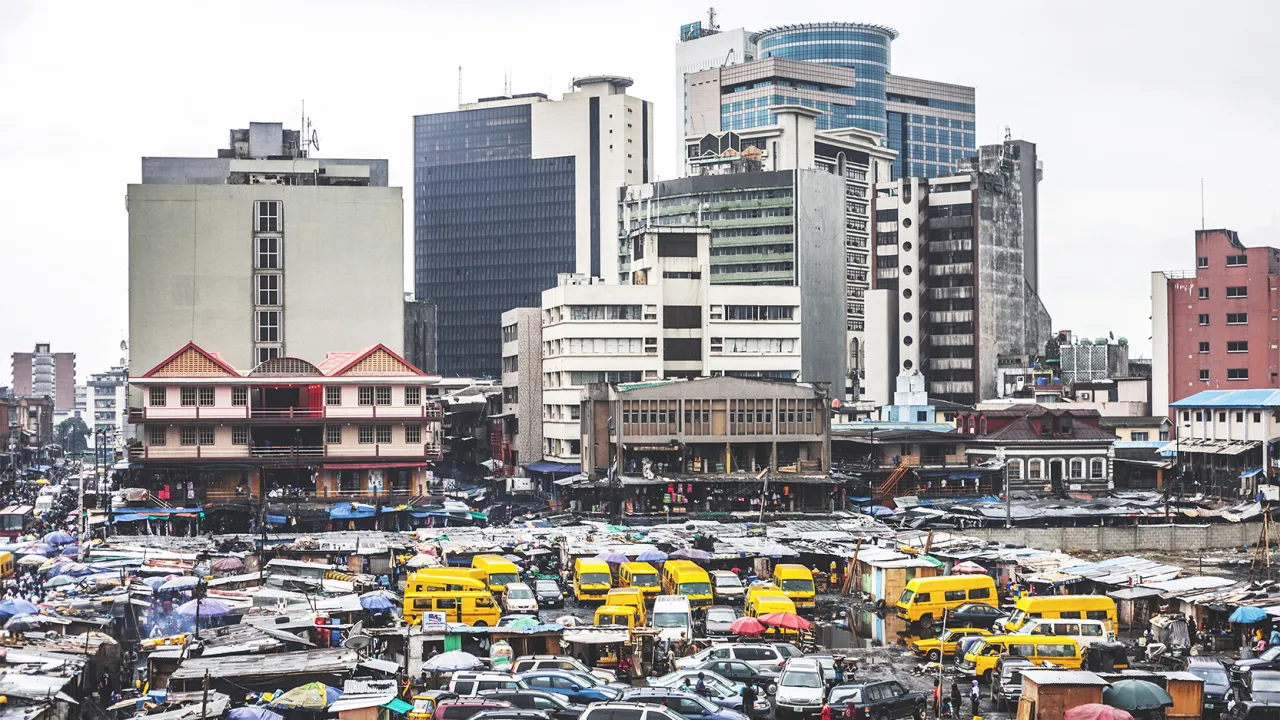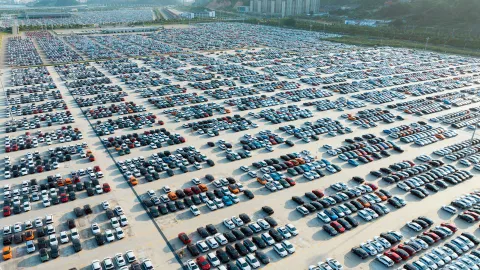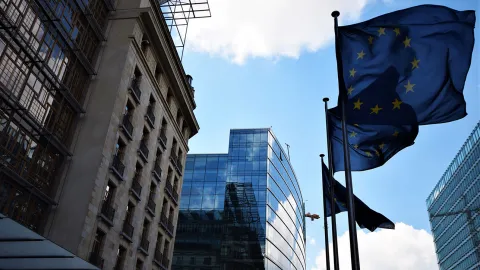Countries and markets 3/2021: Finland aims to accelerate exports to Africa - Nigeria, South Africa and Ethiopia are potential markets when the corona pandemic and crises alleviate

The general image of Nigeria is that a large market offers many opportunities. However, as an operating environment, the country is challenging and the risks are high. Through reliable local partners, interesting opportunities can be found in different sectors, says Mika Relander, Senior Adviser, who took part in the export promotion trip. Nigeria's largest city Lagos in the picture.
Published date
The objective of the Finnish strategy for Africa is to double trade between Finland and African countries between 2020 and 2030. The corona pandemic has lowered Africa's expectations for development, economic growth has slowed down and indebtedness has increased. The launch of the African continent free trade area, which has raised hopes, has also progressed slowly. However, the continent has relatively large markets, such as Nigeria, South Africa and Ethiopia, which has entered civil war, and their favourable economic development would also create export potential for Finnish companies. The availability and conditions of funding guide investments, especially in the context of higher credit risk. South Africa, where Finnvera can grant export guarantees, has the best credit rating among these countries. Guarantees for Nigeria are granted on a case-by-case basis, but export guarantees for previously promising Ethiopia are currently off cover.
Nigeria can open up export potential for people who know the operating environment and customs
Nigeria passed South Africa at the end of the last decade as the largest economy in Sub-Saharan Africa. The country's population growth is fast. It is estimated that the population of over 200 million people will more than double by 2050. The growth potential of the economy is enormous, but the development has problems due to political instability, fluctuations in oil prices, COVID-19 and weak institutions. The country is classified as a lower average income country. One third of the workforce is unemployed. COVID-19 vaccinations have progressed slowly, and anti-vaccination attitude is common.
Exports of oil and gas account for up to 80% of central government revenue and export revenue. Thus, in 2020, the value of oil exports dropped by as much as 40 per cent from the previous year, as prices fell. In 2021, the rise in oil prices has improved the situation. Economic growth is expected to remain at 3-4% in the coming years.
Nigeria's current account turned into a surplus and public debt is at a very reasonable level. Despite the COVID-19 crisis, the state still has several options to increase funding for its development projects, as not only development funders but also international market-based financial markets are available, even though the country's international ratings reflect a relatively high risk. The country's foreign reserves are at a reasonable level. In foreign trade, the complexity of the currency system crates difficulties, but the rise in the value of oil exports and the increase in the country's oil refining capacity are expected to also improve the currency situation in 2022. The central bank is aware of the slowness of the currency transfer and seeks to find solutions.
However, important economic reforms (such as tax increases, abolition of subsidies) will not proceed before the presidential elections in 2023.
Nigeria is a federal state whose President has usually been elected in turns from the north or from the south. During the current North-representing President Buhari, no solutions have been found to high unemployment or the problem of poverty. At the same time, however, the large domestic market in Nigeria has enabled the rapid development of certain regions and sectors. The most important regions are under the control of the government, but some of the regions are unstable, which hinders the country's development and economic growth. The country's safety apparatus aims to control the most acute crises alternately: The states of the north-east are suffering from Islamist terrorist organisations, and in the middle there are disputes between farmers and shepherds. In the south-east, the unrest is increased by the new legislation that divides oil incomes. As an operating environment, the country is challenging, for example, because of corruption, security issues and human abductions.
A Finnish company interested in the Nigeria market should be familiar with the country's macroeconomic challenges and the complex, partly politicised institutions associated with them. The Finnish Embassy in Abuja and Team Finland actors help in this. Knowledge of the approaches opens up opportunities for implementing selected projects when credit risks have been carefully analysed.
Nigeria's country category is 6/7 (country category 7 is the weakest). Finnvera may grant new export credit guarantees to Nigeria on a case-by-case basis. Finnvera covers the risks of letters of credit from several Nigerian banks.
Take a look at Finnvera's country classifications.
On an export promotion trip to Nigeria. Pictured from left: Tony Elumelu, Chairman of Heirs Holding, Deputy Head of Mission Johanna Antila and Ambassador Leena Pylvänäinen from the Embassy of Finland in Nigeria, Under-Secretary of State Nina Vaskunlahti from the Ministry of Foreign Affairs, Trade Commissioner Olu Raheem from Business Finland Nigeria and Senior Adviser Mika Relander from Finnvera. Tony Elumelu is the owner of United Bank of Africa, among others, and is active in Nigeria’s oil and gas, health and real estate sectors. Heirs Holdings is a foundation operating in 20 African countries, which promotes e.g. start-up entrepreneurship.
COVID-19 has hit the South African economy, but the institutions of the society are still strong
South Africa, which has almost 60 million inhabitants, is classified as a country with a higher average income. Due to the corona pandemic, GDP decreased by 7 per cent in 2020, but economic growth of up to 5 per cent is expected for 2021 depending on the calculation method. The discovery of the new COVID-19 mutation Omikron in Southern Africa made the economic outlook gloomier towards the end of 2021. The South African President has appealed to the West to avoid severe travel restrictions on the country.
The pandemic has exacerbated social problems and there have been unrest due to the weakened purchasing power and COVID-19 restrictions. Anti-vaccination attitude is common, but on the other hand, in November 2021, more than a quarter of the country's population had received one vaccine, and a large part of the population is considered to have antibodies due to having had COVID-19 disease.
Economic recovery is reinforced by the fact that inflation has remained moderate and interest rates have remained relatively low. South Africa produces a lot of minerals and the global demand for raw materials and the level of prices on the world market has been strengthened. Before discovering the omicron variant, it was hoped that foreign investors would become more interested in the country. In addition to the disease situation, economic growth and attracting investment are hampered by the weakened operating environment during the term of the previous President Zuma, and due to the increasing number of power cuts caused by corruption and a failed energy policy.
The fact that there are some of the best virus research institutes in the world is illustrative of the dual distribution of development in the country, but the health sector's functional capacity has not been sufficient to vaccinate the poor population.
International rating agencies weakened the country's rating during the corona pandemic, although the country's exchange rate and its financing risk margins were restored from the shock caused by COVID-19. The country's foreign reserve assets are at an adequate level, while the rate of the rand continues to fluctuate as crisis times continue. The corona pandemic has increased public sector indebtedness. Weak economic growth increases public sector austerity pressures, while state-owned companies have a weak financial situation. There are many conflicts in the political field, such as the redistribution of land ownership in a manner that the country's reputation as a rule of law is not jeopardised.

The South African currency rand pictures the former president Nelson Mandela. The rate of the rand has fluctuates during the crisis.
The growing global demand for raw materials could lead to growth in South Africa and possibly structural reforms. During the current government term of President Ramaphosa, it is hoped that the focus will remain on solving the country's economic problems. One third of the population is unemployed, the productivity of work is poor and there are major shortcomings in education. Corruption has increased and the country has fallen 84/190 in the World Bank's Doing Business rating. On the other hand, the South African tax system is among the best in the world, and the banking and currency system and the legal system as a whole are assessed to be good. The largest banks in the country have survived well from previous crisis periods, so their resilience can be considered good. The state has not restricted foreign exchange traffic during COVID-19 or previous economic crises.
South Africa has a country category of 4/7. Finnvera may grant new export credit guarantees to South Africa (credit insurance, buyer credit guarantees, credit guarantees, export trade guarantees) to finance exports to eligible risk areas with different payment periods. Finland also has an active embassy in South Africa and Team Finland activities to pave the way for Finnish companies to the market.
Ethiopia - the export market that recently seemed promising entered rapidly in a crisis
For decades, Ethiopia has been one of the fastest growing economies in the world. However, high growth rates are partly explained by the low initial level of GDP. Ethiopia, with its 110 million inhabitants, is classified as a low-income country and the national economy has not developed very well as a market economy, but the direction has long been encouraging. A few years ago, the hopes were raised by Prime Minister Abiy Ahmed Ali, who was awarded the Nobel Peace Prize in 2019, whose administration has pushed for the necessary economic reforms by means of the market-based nature of the economy. The ambitious objective of the Abiy regime was to reform the division of powers based on the ethnic federal structure and to make the administration and decision-making of a rigid, closed and state-led socialist country more flexible. The objectives included an extensive privatisation plan for state-owned companies, which was hoped to lead to more efficient business environment and attract foreign investments to the country.
However, a positive development stopped in autumn 2020, when the northern Tigray province refused national elections as a result of the reorganisation of power, leading to an armed conflict between the Ethiopian army and the province's TPLF party. Ethiopia has slipped in a year from a regional armed conflict to a more or less nationwide civil war, resulting in a threat to its future and identity as a federal state.

The capital of Ethiopia, Addis Ababa, is located in Oromia province. The city's population is approximately 3 million.
As the crisis worsened, the Ethiopian Government declared a six-month emergency at the beginning of November 2021. There have also been other groups against the government and the new division of powers in different parts of the country, such as Prime Minister Abiy's province of Oromia, which indicates the complexity of the situation. So far, it is difficult to assess the real capacity or plans of the rebel groups to take over the capital Addis Ababa and the country's regime, but the deterioration and transformation of the situation into a full civil war is considered possible, even likely. It can be said that Ethiopia is threatened by some degree of balkanisation, that is, fragmentation into several states. According to the latest information, the situation has again turned to favour the central government and the battles have withdrawn from the capital towards the north, closer to the initial standing of the crisis. However, the political solution to the crisis is still at the beginning.
It is a political crisis stemming from the country's new power allocation plans, the rapid resolution of which is considered unlikely and which is generally expected to continue for a long time and to destroy the already weak public economy of the state. As a result of the acute situation, the debt restructuring necessary for the country's economy and the emergency financing of the IMF are frozen so far, which can lead to the insolvency of the country' s economy, even at a rapid pace. In order to speed up the resolution of the conflict and put an end to alleged human rights violations, the United States has imposed sanctions on all parties to the conflict. As they become more specific, they may make it more difficult for financiers to operate in the country and pose challenges to favourable investment-driven economic development. International companies are under way to find a peaceful solution, but there are no signs of their effectiveness yet. There is also a risk of the conflict spreading to other countries. Old hostilities with Eritrea, for example, are sensitive to re-escalating.
Finnvera has export guarantees granted to Ethiopia, and the development of the situation affects our attitude towards both existing guarantees and future financing opportunities for Ethiopia. The country is a good example of a high-risk country where situations change rapidly. The export market, which seemed promising a few moments ago, becomes challenging very quickly. However, it is possible that the situation will be resolved and the positive development of Ethiopia can continue again. At the moment, Finnvera does not grant new export credit guarantees to the country, but we are closely monitoring the development of the situation.
Authors:
South Africa and Nigeria: Outi Homanen, Senior Adviser, South Asia, South and West Africa
Ethiopia and Nigeria: Mika Relander, Senior Adviser, Latin America and East Asia (for example: China), East Africa
Further information:
Anu-Leena Koskelainen, Team Leader, Country risk management, Finnvera, tel. +358 29,460 2819, [email protected]
More on the topic:
Countries and markets 2/2021: Is trade with Russia and Belarus still possible? | Finnvera
Countries and markets 1/2021: China recovers from the pandemic, Turkish economy faces difficulties – Myanmar opens and shuts | Finnvera
Countries and markets 3/2020:The COVID-19 pandemic slows down export
Countries and markets 2/2020:African potential - How does the COVID-19 pandemic affect the economic development of the continent?



